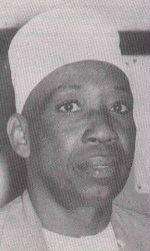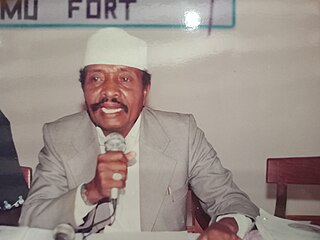Related Research Articles

Swahili, also known by its local name Kiswahili, is a Bantu language originally spoken by the Swahili people, who are found primarily in Tanzania, Kenya, and Mozambique. Estimates of the number of Swahili speakers, including both native and second-language speakers, vary widely. They generally range from 60 million to 150 million; with most of its native speakers residing in Tanzania.

Taarab is a music genre popular in Tanzania and Kenya. It has been influenced by the musical traditions of the African Great Lakes, North Africa, the Middle East, and the Indian subcontinent. Taarab rose to prominence in 1928 with the advent of the genre's first star, Siti binti Saad.

Shaaban bin Robert, also known as Shaaban Robert, was a Tanzanian poet, author, and essayist who supported the preservation of Tanzanian verse traditions. Robert is celebrated as one of the greatest Tanzanian Swahili thinkers, intellectuals and writers in East Africa and has been called "poet laureate of Swahili" and is also known as the "Father of Swahili." He is also honoured as the national poet.
The Gusii language is a Bantu language spoken in Kisii and Nyamira counties in Nyanza Kenya, whose headquarters is Kisii Town,. It is spoken natively by 2.2 million people, mostly among the Abagusii. Ekegusii has only two dialects: The Rogoro (upper-side) and Maate (lower-side) dialects. Phonologically, they differ in the articulation of /t/. Most of the variations existing between the two dialects are lexical. The two dialects can refer to the same object or thing using different terms. An example of this is the word for cat. While one dialect calls a cat ekemoni, the other calls it ekebusi . Another illustrating example can be found in the word for sandals. While the Rogoro word for sandals is chisiripasi , the Maate dialect word is chitaratara . Many more lexical differences manifest in the language. The Maate dialect is spoken in Tabaka and Bogirango. Most of the other regions use the Rogoro dialect, which is also the standard dialect of Ekegusii.
The Swahili people comprise mainly Bantu, Afro-Arab, and Comorian ethnic groups inhabiting the Swahili coast, an area encompassing the Zanzibar archipelago and mainland Tanzania's seaboard, littoral Kenya, northern Mozambique, the Comoros Islands, and northwest Madagascar.

In Uganda the most spoken language in the capital city is Luganda, followed by English, as all schools in Uganda use it in their studies due to the introduction of English during the colonial period. English is also the language of business and judicial matters. Most spoken after Luganda and English is Swahili. This language is more common in neighbouring Kenya and Tanzania. Swahili is taught in schools as an optional additional language and it is mostly spoken by the Ugandan army. In 2005, there were talks to include Swahili as the second official language as it was seen as neutral, however this is still not ratified by the government. Swahili is used among some communities bordering South Sudan and Kenya.

Following Tanganyika's independence (1961) and unification with Zanzibar (1964), leading to the formation of the state of Tanzania, President Julius Nyerere emphasised a need to construct a national identity for the citizens of the new country. To achieve this, Nyerere provided what has been regarded by some commentators as one of the most successful cases of ethnic repression and identity transformation in Africa.
Kenyan Sign Language is a sign language is used by the deaf community in Kenya and Somalia. It is used by over half of Kenya's estimated 600,000 deaf population. There are some dialect differences between Kisumu, Mombasa and Somalia.
Baraza la Kiswahili la Taifa is a Tanzanian institution responsible with regulating and promoting the Kiswahili language.
Muziki wa dansi, or simply dansi, is a Tanzanian music genre, derivative of Congolese soukous and Congolese rumba. It is sometimes called Swahili jazz because most dansi lyrics are in Swahili, and "jazz" is an umbrella term used in Central and Eastern Africa to refer to soukous, highlife, and other dance music and big band genres. Muziki wa dansi can also be referred to as Tanzanian rumba, as "african rumba" is another name for soukous.
Baraza la Muziki la Taifa was a national council created in 1974 by the government of the newly independent Tanzania. Its purpose was to regulate the music business in the country, in the context of a wider programme intended to create a solidified national identity. This, in turn, was a crucial element in Ujamaa, President Julius Nyerere's version of african socialism. Similar institutions were founded to rule over other aspects of the nation's culture, including the nationwide adoption of Swahili language and the development of Tanzanian art (BASATA). The overall idea was to build a new popular culture for the workers and peasants of the country, free from the heritage of colonialism and bourgeoisie culture.
Swahilization or Swahilisation refers to one of two practices:
Vijana Jazz Orchestra is a Tanzanian muziki wa dansi band that reached its peak of popularity in the 1980s. As with many other dansi bands of the times, it was sponsored by a government institution, namely the Umoja wa Vijana, i.e., the youth wing of Tanzania's ruling party Tanganyika African National Union (TANU).

Mathias E. Mnyampala (1917–1969) was a Tanzanian writer, lawyer, and poet. Mnyampala was born on 18 Novembern 1917 according to a personal record form but he wrote in his autobiography, Maisha ni kugharimia, that he only knew the year with accuracy. He was born in the hamlet of Muntundya depending on the village of Ihumwa in Chamwino District in Dodoma region at the time part of German East Africa. He died on 8 June 1969 in Dodoma city, Tanzania. Mnyampala wrote in Swahili, the lingua franca of East Africa, not Cigogo, the native language of his ethnic group.
Taasisi ya Taaluma za Kiswahili, known by its acronym TATAKI, is a research body dedicated to the research of the Kiswahili language and literature at the University of Dar es Salaam in Tanzania.

Dr. Kimani Njogu is a Kenyan linguist known for his study of and advocacy for the Kiswahili language.
Haji Gora Haji was a Swahili-language poet, lyricist, and writer from the Zanzibar archipelago. He channeled his expansive knowledge of the culture and society of the Swahili coast, especially his homeland of Tumbatu, into his works. For his work inspired by the seascape of his home, he has been called "The Old Typhoon". He worked in a multitude of forms, from songs, stories, and epics to a full-length novel. His compositions and verse were frequently on Tanzanian radio.

Ngoma(also ng'oma or ing'oma) is a Bantu term with many connotations that encompasses music, dance, and instruments. In Tanzania ngoma also refers to events, both significant life-changing events such as the first menstruation or the birth or passing of a loved one, as well as momentary events such as celebrations, rituals, or competitions. Ngoma was the primary form of culture throughout the Great Lakes and Southern Africa. Today it is most notable in Tanzania, where it is deemed an official music genre by the National Arts Council (BASATA - Baraza la Sanaa la Taifa). In Tanzania, it is experienced throughout the country and performed, taught, and studied in many schools and universities. The most notable school for ngoma is the Bagamoyo Arts and Cultural Institute, which produces the most prominent chairmen (directors/conductors) and dancers.
World Swahili Language Day is observed annually on 7 July. This began when UNESCO declared 7 July as Swahili Language Day in 2022. On 7 July 1954, Tanganyika African National Union (TANU) leader Julius Kambarage Nyerere, the future first president of Tanzania, adopted the Swahili language as a unifying language for African independence struggles. Jomo Kenyatta, the first president of Kenya, followed suit and also used the Swahili language to mobilize and unify the people of Kenya in the struggle against colonialism through the use of the popular "Harambee" slogan.

Ahmed Sheikh Nabhany was a Kenyan academic scholar, poet, lexicologist, historian and professor often regarded as the father of modern Swahili poetry. He was the recipient of The Order of the Grand Warrior (O.G.W).
References
- 1 2 3 4 Njogu, Kimani (2003). "Language policy in Kenya: the opportunities, the challenges". In Mugane, John M. (ed.). Linguistic typology and representation of African languages. Africa World Press. pp. 69–82. ISBN 1-59221-155-0.
- 1 2 Mazrui, Alamin M. (2016). Cultural Politics of Translation: East Africa in a Global Context. Routledge. pp. 118–126. ISBN 9781317233190.
- ↑ Schadeberg, Thilo C. (2009). "Loanwords in Swahili". In Haspelmath, Martin; Tadmor, Uri (eds.). Loanwords in the World's Languages: A Comparative Handbook. De Gruyter Mouton. p. 76.
- ↑ "Kutuhusu" (in Swahili). CHAKITA. Archived from the original on October 26, 2016. Retrieved November 7, 2016.